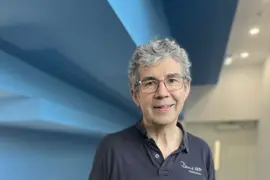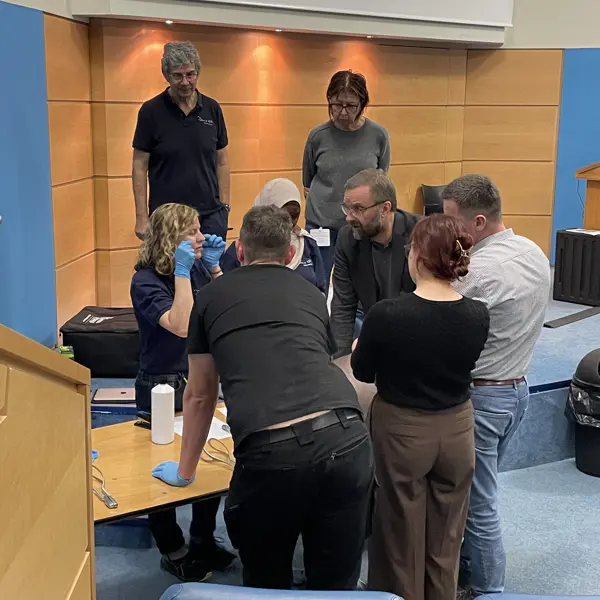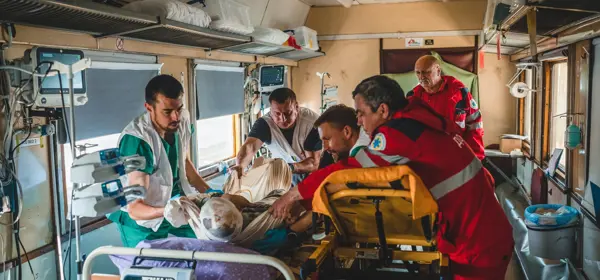Nott for the faint hearted
Nott for the faint hearted
Surgeon David Nott has worked in some of the most dangerous places in the world. He tells Jennifer Trueland why he keeps going back, how he copes and how he is passing on his skills to others
David Nott is apologetic about his broken glasses. The surgeon, who has spent years working in some of the most troubled and war-hit areas of the globe, points to a makeshift repair at the top corner of a frame and explains how the break occurred.
‘There was a fundraising event at the Almeida Theatre about a month ago. There were lots of famous actors on the stage interviewing each other, and finally I was to be interviewed by [Dame] Judi Dench. But I slipped on the stage and broke my glasses on Judi Dench’s shoulder. I repaired it with superglue or Gorilla glue, and I don’t want to get another pair because there aren’t many people who can say they broke their glasses on Judi Dench’s shoulder’, he smiles.
Actually, there aren’t a lot of people who can say they have done even a hundredth of the amazing things Professor Nott has done. For more than three decades, he has worked in disaster and war zones as a volunteer surgeon for organisations including the Red Cross and Médecins Sans Frontières (Doctors without Borders).
I feel there's a necessity for me to keep spinning the plates
David Nott
He has been in acutely dangerous situations; many times, he has feared for his life – coming under sniper fire in Sarajevo, for example, or operating in a hospital as it was being bombed. Places he has worked in include Afghanistan, Gaza, Iraq, Sierra Leone, Syria, Ukraine and Yemen – all the while combining it with his ‘day job’ as a consultant surgeon at Imperial College Healthcare NHS Trust.
As if that wasn’t enough, 10 years ago he and his wife Elly set up the David Nott Foundation, a charity which offers surgical training to doctors and nurses working in war and disaster zones.
Professor Nott has written about many of his experiences in his memoir, War Doctor: Surgery on the Frontline, and he also participated in BBC Radio 4’s Desert Island Discs, giving an emotional interview to the then presenter Kirsty Young. In both, he has spoken about the ‘pull’ of wanting to go to places most people would turn away from, something he describes as almost an addiction.
Credibility
But when we meet, he is a little closer to home, attending a five-day Hostile Environment Surgical Training course, which his foundation is running in conjunction with the Royal College of Surgeons of Edinburgh.
It was in the early 1990s Prof Nott first felt the burning desire to go to the front line to use his surgical skills. The trigger then was seeing a television news report of the suffering in the former Yugoslavia. He persuaded his bosses to allow him to take unpaid leave to go there (they agreed, provided he found rota cover, not an easy task over the Christmas period). Despite some terrifying experiences, he caught the bug and has been on the move ever since.
At that time he was a relatively young consultant and single. Now, however, he is in his late 60s and is married, with two young daughters. However, there are no signs he is slowing down. In the past 12 months, Prof Nott has been to Gaza, Ukraine and Syria, teaching and performing surgery – although not on the front line, he hastens to point out. It’s important, he says, that he maintains credibility, for the foundation more generally, and as director of courses like this one, so, he says, it’s vital to keep travelling.
‘I feel there’s a necessity for me to keep spinning the plates. If I step back, the participants that come on the course won’t feel as if we’re as up to date as we should be, so that’s one reason for continuing,’ he says. ‘But maybe just one or two war zones a year rather than two a month.’
How much is that an excuse because he actually wants to be doing it, I ask (a bit cheekily). Fortunately, he laughs. ‘I do enjoy it, I still do enjoy it,’ he says.
While the injuries are the same, what you can do with what you've got is the difference
David Nott
His children, Molly, nine, and Emily, seven, understand what it is that he does, he says, and it is clear he adores them. But while being a father does change some things, it doesn’t stop him wanting to go to dangerous places. ‘The flame is still there, and it’s still burning quite strongly. I think the thing about having children is that there is no doubt that you have huge responsibilities, and I would always put them first. But if there is an opportunity to be able to do some good, then I will.’
It's important, he says, children understand it’s important not to shy away from what he calls the beauty of altruism. ‘It’s showing that you can go and help someone and it’s a wonderful thing to do.’
His home circumstances might have transformed but the world of conflict is much the same, at least from a surgical perspective. ‘War has changed, but the injuries haven’t changed since 1992,’ he says. ‘In every war, you’ll get bullet wounds, blast wounds, fragmentation injuries, explosive amputations and so on. The difference depends on where you are where you see these injuries.
'For example, when I was in Afghanistan, we were able to salvage 95% of the people that came in severely blown up, whereas in Gaza, I was able to save 5%, simply because of the resources – you can’t make the same decisions in Gaza as in Camp Bastian, because you don’t have the resources, so while the injuries are the same, what you can do with what you’ve got is the difference.’
That requires experience, he says. ‘It requires a knowledge of having seen it before. That’s what we’re trying to teach on this course. We show the worst injuries and we show injuries that are salvageable, but we show injuries that if you have the resources you can do, if you don't have the resources, do not start because you will use up all your resources and you'll have a bad result.’
What shone through in his book was his sense of compassion, but also a willingness to act in a very practical, almost cold way. It feels as though there are two David Notts – one is on the ground ‘doing’ things in the moment, while the other is observing and ensuring the decisions being taken are the right ones for the greatest number of people. ‘I think that’s a good way of describing it, to be honest,’ he says. ‘I think that those decision-making aspects of the job need to be done in a very pragmatic way.’
Sometimes emotions do ‘take control’, however. ‘Sometimes put yourself in very great danger, because you’re emotionally tied up to that patient and you don't want to leave that patient. You know that you should probably leave the patient and save yourself, but you don’t. It's a very odd way of looking at life, but sometimes you put the patient first, and you put yourself second.’
Queen to the rescue
Much as the flame is still burning, and much as he can’t keep away from trouble spots, it’s not always easy. In his book, Prof Nott is open about his struggles with his mental health, particularly his experiences with PTSD after gruelling missions.
In the book, he even describes how he almost broke down during lunch with the late Queen Elizabeth in 2014, having just come back from a particularly gruelling period in Syria (she recognised his distress and brought him comfort by playing with and feeding her corgis). Does the impact on him of what he does make it harder to be a parent to his beloved daughters?
He pauses for a moment. ‘I do bring it home, and sometimes it’s very difficult,’ he says quietly. ‘They see that their father is a human being. I do suffer from being depressed, angry and anxious. They do see that I’m not infallible. But if you can show them love, constantly, that’s the most important thing.’
(Images by Jennifer Trueland)




